by Emily Rotthaler–Sitting at a table in the student government office on a random Thursday morning, I find myself attempting to paint a flame on a tote bag while listening to the newest Top 40 songs on the radio. The acrylic paint is all over my fingers and it has made it hard to continue snacking on the Snickers I received upon coming to the event.
As I sit there and carefreely paint and snack and hum to songs, a thought suddenly strikes me: What on earth am I doing here painting when I have a thousand assignments and other responsibilities desperately waiting for my attention?
While this thought induces slight feelings of anxiety, it does not impact me enough to abandon the tote bag and behave like an adult. “I’ll just finish my assignments at night,” I think while dipping the paintbrush into orange paint, fully aware I will be up until 4 am to get everything done.
A carefree morning? Yes. Behavior a 22-year-old college senior should exhibit? Probably not.
I take some consolation in the knowledge I’m not the only student who escapes their overwhelming assignments and responsibilities by letting out their inner child. Several times a semester students can be found meeting up on campus to paint, handcraft, ice skate, sing, laugh, or play bingo.
These recreational events are hosted by MAC, short for Morningside’s Activities Council, and have been a constant part of student life since 2010. Once a week, and on special occasions like Homecoming several times a week, MAC hosts events for students.
The organization’s current president, senior Brett McEachern, sees MAC’s purpose as multifaceted. Most of the events serve the purpose of entertainment while also including a social component. McEachern said, “We also attempt to provide a forum for students to entertain other students when we do events such as karaoke and lip sync battles.”
In McEachern’s experience, college students are drawn to MAC events because they find them enjoyable and because they can attend them without having to be in a club.
The success of recreational events as a fixed part of college life is visible in the number of students that flock to the MAC events. Most events have attracted major crowds. According to McEachern, 350 students for example gathered at Stuff-A-Bear, 240 students “hugged” a cactus, and Homecoming Bingo with its promise of shimmering prizes lured 294 students out of their dorms.
He said, “If you want to define success as students coming to our events, our events that do the best would probably be the events known as our Make-And-Takes or Novelty Events. In these events, MAC buys things for students to make or decorate in their spare time.”
The high number of students in attendance have not been a recent development. If one goes far enough back on the MAC Facebook page, pictures of all kinds of activities show up. Some activities are more college campus appropriate than others but what they all have in common is a major crowd of college students enjoying themselves and socializing.
Morningside is not the only campus that has recognized and integrated the benefits of leisure activities into campus life. MAC is a part of the National Association for Campus Activities, short NACA. NACA started in North Carolina in 1960 and has since extended its program to the whole US.
Once a year, the country’s campus event organizations can join their region’s NACA conference to connect with new talent. In a talent show-like format, member organizations pick and choose which acts they want to come to their campus the next year and have the chance to book them right away.
Besides NACA’s main focus of entertainment, its member organizations’ activities have been found to hold several other benefits which consciously or subconsciously attract students. Taking part in psychologically engaging activities has been shown to lead to lower stress levels, a lower heart rate, and a better mood.
As a result, events like those hosted by MAC allow students to break the stress cycle and attack their assignments with new energy. A healthy version of procrastination so to say.
MAC’s former public relations executive Ashley Duncan knows of the mental health benefits of the events she helped host during her time at Morningside. She said, “The events are a good way for students to take a little break from everything else.”
Freshman Aleisha Thayer is sitting on a table a few feet away from me, drawing a flowery meadow on a bag. With concentration written across her face, she outlines the flowers with skillful flicks of the pencil before taking a paintbrush and painting the background a sky-blue color.
Since she arrived on campus in August, Thayer has taken advantage of a variety of MAC events. The ones she has enjoyed the most have been hands-on activities like painting and sporty activities like the trampoline park. “The events are a fun way to meet new people and make new friends,” she said. “They also help me to just get away from all the stress that may be going on.”
The perspectives of Thayer, McEachern, and Duncan have put the activities in a new light. The benefits of the events that students seem to intrinsically sense, justify their existence on campuses. Maybe instead of worrying about wasting time attending MAC events, I should take even more advantage of them and their benefits. Besides getting a degree, socializing and building a network of friends and acquaintances, after all, is one of college’s main purposes.
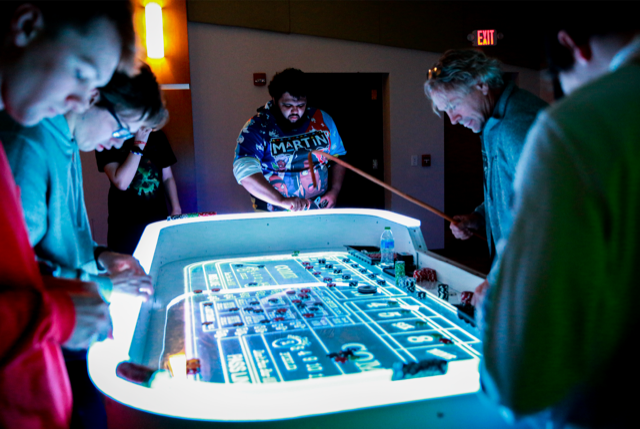
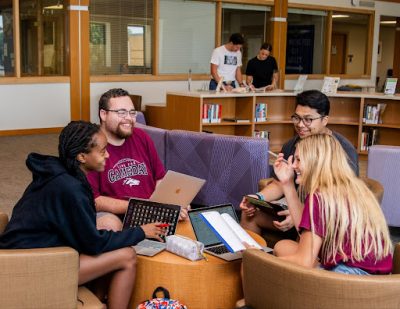
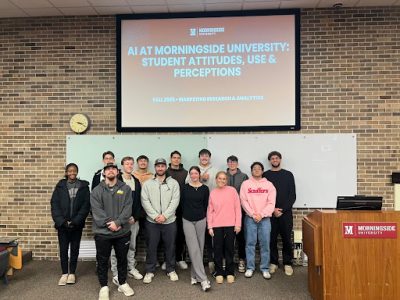

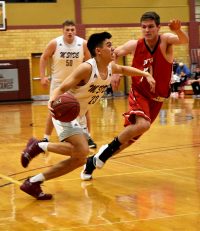
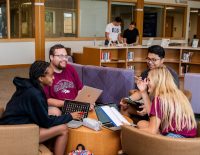
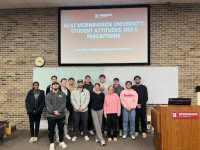


Leave a Reply